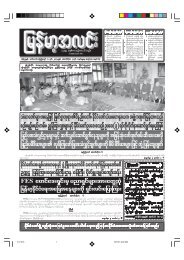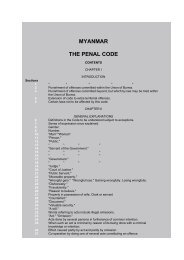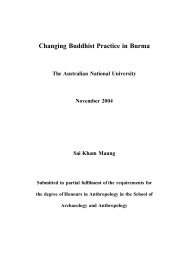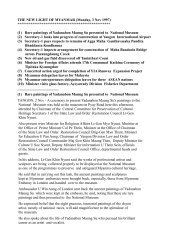Monks step in to avert clashes at mine site - Online Burma/Myanmar ...
Monks step in to avert clashes at mine site - Online Burma/Myanmar ...
Monks step in to avert clashes at mine site - Online Burma/Myanmar ...
Create successful ePaper yourself
Turn your PDF publications into a flip-book with our unique Google optimized e-Paper software.
TIMESBUSINESS<br />
Garment sec<strong>to</strong>r plots bright<br />
future, with Western help<br />
April 29 - May 5, 2013<br />
25<br />
Domestic fashion<br />
<strong>in</strong>dustry thriv<strong>in</strong>g<br />
By My<strong>at</strong> May Z<strong>in</strong><br />
By Soe Sandar Oo<br />
THE lift<strong>in</strong>g of European Union<br />
sanctions on April 22 might<br />
herald a bright future for<br />
<strong>Myanmar</strong>’s garment sec<strong>to</strong>r<br />
if the country can benefit<br />
from the generalised system<br />
of preference st<strong>at</strong>us, which<br />
lowers import tariffs, <strong>in</strong> the EU<br />
and United St<strong>at</strong>es.<br />
U My<strong>in</strong>t Soe, chairman<br />
of the <strong>Myanmar</strong> Garment<br />
Manufacturers Associ<strong>at</strong>ion<br />
(MGMA), said <strong>at</strong> the start of<br />
a bus<strong>in</strong>ess m<strong>at</strong>ch<strong>in</strong>g event<br />
between <strong>Myanmar</strong> and Hong<br />
Kong garment and textile<br />
<strong>in</strong>dustries on April 24 th<strong>at</strong><br />
<strong>Myanmar</strong> might be granted<br />
GSP st<strong>at</strong>us on June 4.<br />
“EU sanctions were lifted<br />
last Monday and hopefully we<br />
will be granted GSP st<strong>at</strong>us<br />
by the US on June 4,” he<br />
<strong>to</strong>ld the 30 represent<strong>at</strong>ives <strong>at</strong><br />
the meet<strong>in</strong>g, which was held<br />
<strong>at</strong> the Union of <strong>Myanmar</strong><br />
Feder<strong>at</strong>ion of Chambers of<br />
Commerce and Industry. “This<br />
is the huge opportunity for<br />
<strong>in</strong>tern<strong>at</strong>ional companies <strong>to</strong><br />
<strong>in</strong>vest <strong>in</strong> <strong>Myanmar</strong>’s garment<br />
sec<strong>to</strong>r.”<br />
“If we can get GSP st<strong>at</strong>us<br />
from the US it will mean we<br />
can do more bus<strong>in</strong>ess with<br />
<strong>in</strong>tern<strong>at</strong>ional companies.<br />
They will be able <strong>to</strong> <strong>in</strong>vest <strong>in</strong><br />
<strong>Myanmar</strong> and be assured th<strong>at</strong><br />
they can get access <strong>to</strong> the EU<br />
and US markets,” he said.<br />
U My<strong>in</strong>t Soe said<br />
<strong>Myanmar</strong>’s garment sec<strong>to</strong>r<br />
had many <strong>in</strong>centives for foreign<br />
companies, <strong>in</strong>clud<strong>in</strong>g tax<br />
breaks, cheap labour and an<br />
<strong>at</strong>tractive foreign <strong>in</strong>vestment<br />
law. However, he said electricity<br />
shortages <strong>in</strong> the hot months<br />
were problem<strong>at</strong>ic but expected<br />
the shortages would be solved<br />
by the government, which is<br />
work<strong>in</strong>g <strong>to</strong> ensure adequ<strong>at</strong>e<br />
supplies.<br />
<strong>Myanmar</strong>’s garment exports<br />
hit a high of about US$826<br />
million <strong>in</strong> 2001, just before<br />
the United St<strong>at</strong>es announced<br />
Workers stitch garments <strong>at</strong> a garment fac<strong>to</strong>ry <strong>in</strong> Yangon last week. Pic: Aung Htay Hla<strong>in</strong>g<br />
a ban on imports. But by<br />
2012, the value of exports had<br />
recovered <strong>to</strong> more than $900<br />
million, with more than 75<br />
percent shipped <strong>to</strong> Japan and<br />
South Korea. Less than $200<br />
million worth of goods were<br />
sent <strong>to</strong> Europe.<br />
U Aung W<strong>in</strong>, MGMA vice<br />
chairman, <strong>to</strong>ld The <strong>Myanmar</strong><br />
Times: “We have cont<strong>in</strong>uously<br />
made and exported garments<br />
s<strong>in</strong>ce 1993. We are wait<strong>in</strong>g for<br />
GSP st<strong>at</strong>us but we must also<br />
ensure th<strong>at</strong> our quality levels<br />
meet the standards required<br />
for those markets.”<br />
He added th<strong>at</strong> there are more<br />
than 300 garment fac<strong>to</strong>ries <strong>in</strong><br />
<strong>Myanmar</strong>.<br />
Daw San San My<strong>in</strong>t,<br />
deputy direc<strong>to</strong>r of <strong>Myanmar</strong><br />
Investment Commission’s<br />
Yangon branch, which opened<br />
on April 10, said most of the<br />
<strong>in</strong>form<strong>at</strong>ion requests handled<br />
by the office s<strong>in</strong>ce it was opened<br />
have concerned the garment<br />
sec<strong>to</strong>r. She added th<strong>at</strong> 25 of<br />
40 requests have been about<br />
the sec<strong>to</strong>r.<br />
“MIC has <strong>to</strong> expla<strong>in</strong> <strong>to</strong><br />
<strong>in</strong>ves<strong>to</strong>rs about the foreign<br />
<strong>in</strong>vestment law first, especially<br />
equity ownership r<strong>at</strong>ios, as<br />
well as tax<strong>at</strong>ion,” she said.<br />
“Companies from S<strong>in</strong>gapore,<br />
Hong Kong and Taiwan have<br />
shown the gre<strong>at</strong>est <strong>in</strong>terest<br />
so far but I th<strong>in</strong>k there might<br />
be <strong>in</strong>vestments made from the<br />
EU and possibly Canada <strong>to</strong>o<br />
if <strong>Myanmar</strong> is granted GSP<br />
st<strong>at</strong>us,” she said.<br />
Mr Lewis Leung, president<br />
of Price Edward Road<br />
Management <strong>in</strong> Hong Kong,<br />
which oper<strong>at</strong>ed garment<br />
fac<strong>to</strong>ries <strong>in</strong> <strong>Myanmar</strong> from<br />
1995 <strong>to</strong> 2000, said <strong>Myanmar</strong><br />
could compete with Cambodia<br />
and Bangladesh if it receives<br />
GSP st<strong>at</strong>us.<br />
“<strong>Myanmar</strong> can compete with<br />
them but the profit won’t be as<br />
high as <strong>in</strong> Bangladesh,” he said.<br />
“I am <strong>in</strong>terested <strong>in</strong> <strong>in</strong>vest<strong>in</strong>g <strong>in</strong><br />
Bago Region because it is so<br />
near <strong>to</strong> Yangon and has a large<br />
available workforce,” he said.<br />
He added th<strong>at</strong> the quality of<br />
<strong>Myanmar</strong>’s garments is good.<br />
However, U My<strong>in</strong>t Soe<br />
said companies would<br />
need <strong>to</strong> <strong>in</strong>crease their<br />
awareness of <strong>in</strong>tern<strong>at</strong>ional<br />
standards, especially labour<br />
rights and conditions. But<br />
the MGMA, Intern<strong>at</strong>ional<br />
Labour Organis<strong>at</strong>ion and<br />
labour activists would assist<br />
companies <strong>in</strong> this effort.<br />
He added th<strong>at</strong> the average<br />
wage for a garment worker is<br />
about $100 a month.<br />
U My<strong>at</strong> Th<strong>in</strong> Aung,<br />
chairman of the Hla<strong>in</strong>g<br />
Tharyar Industrial Zone, said<br />
many <strong>in</strong>tern<strong>at</strong>ional companies<br />
oper<strong>at</strong>e garment fac<strong>to</strong>ries<br />
<strong>in</strong> Thailand but might shift<br />
production <strong>to</strong> <strong>Myanmar</strong> if it is<br />
given GSP st<strong>at</strong>us.<br />
“But we still need <strong>to</strong> solve the<br />
electricity shortages and high<br />
land prices,” he added.<br />
MIC d<strong>at</strong>a shows th<strong>at</strong><br />
most garment production<br />
<strong>in</strong> <strong>Myanmar</strong> – about 60pc<br />
– is cutt<strong>in</strong>g, manufactur<strong>in</strong>g<br />
and process<strong>in</strong>g work, which<br />
provides quick profits <strong>to</strong><br />
opera<strong>to</strong>rs but does not help the<br />
n<strong>at</strong>ion <strong>to</strong> build a manufactur<strong>in</strong>g<br />
base s<strong>in</strong>ce all raw m<strong>at</strong>erials are<br />
imported from abroad.<br />
UNDAUNTED by the former sanctions regime,<br />
<strong>Myanmar</strong>’s home-grown garment <strong>in</strong>dustry is<br />
thriv<strong>in</strong>g, <strong>in</strong>dustry experts say. They <strong>at</strong>tribute the<br />
success <strong>to</strong> the <strong>in</strong>dustry’s ability <strong>to</strong> c<strong>at</strong>er <strong>to</strong> local<br />
tastes.<br />
Over the past five years, local garment brands<br />
have been tak<strong>in</strong>g over more space because of their<br />
competitive price and good quality, some say. Unlike<br />
export-oriented bus<strong>in</strong>esses, they can employ and<br />
pay staff year-round without the need <strong>to</strong> wait for<br />
orders from overseas.<br />
“We can pay the same wages throughout the year,<br />
without night-work and overtime, because we are<br />
oper<strong>at</strong><strong>in</strong>g the fac<strong>to</strong>ry regularly. We know the tastes<br />
of <strong>Myanmar</strong> women and wh<strong>at</strong> k<strong>in</strong>d of designs they<br />
prefer. Normally we copy the designs from Thai<br />
garments,” said Daw Se<strong>in</strong> Lae Lae, owner of Dear<br />
Brand garment fac<strong>to</strong>ry <strong>in</strong> Shwe Pyi Thar <strong>to</strong>wnship.<br />
The fac<strong>to</strong>ry has more than 400 workers.<br />
“Garments produced for the local market cre<strong>at</strong>e<br />
much less stress for our workers than garments<br />
meant for export. Sometimes fac<strong>to</strong>ries produc<strong>in</strong>g<br />
for export have <strong>to</strong> pay penalties for not meet<strong>in</strong>g<br />
requirements. We can do our best for our own brand.<br />
If we don’t ma<strong>in</strong>ta<strong>in</strong> our quality, cus<strong>to</strong>mers will<br />
choose another brand,” she said.<br />
“We import the raw m<strong>at</strong>erials for our product from<br />
Ch<strong>in</strong>a, especially Shanghai. Power cuts here push<br />
up the production cost. But I have <strong>to</strong> look after my<br />
workers even when profits dip,” she said.<br />
She added th<strong>at</strong> it is rare for local fac<strong>to</strong>ries <strong>to</strong><br />
employ their own designers. Instead, they copy<br />
Ch<strong>in</strong>ese or Thai designs and modify them for local<br />
preferences.<br />
“We do face a problem of design copy from<br />
competi<strong>to</strong>rs, and from Ch<strong>in</strong>a,” said Daw Phyu Phyu<br />
Se<strong>in</strong>, owner of Spike garment fac<strong>to</strong>ry, which employs<br />
more than 1500 workers.<br />
“When our new design cre<strong>at</strong>es a lot of demand,<br />
copies come on <strong>to</strong> the market with<strong>in</strong> weeks. We<br />
have our own designer, who designs for the whole<br />
country. Some fac<strong>to</strong>ries produce garments only for<br />
one city, and some are oriented <strong>to</strong>wards other st<strong>at</strong>es<br />
and regions.<br />
“We <strong>in</strong>tend our designs <strong>to</strong> be suitable for women<br />
of all ages. We sell more than 20,000 products for a<br />
s<strong>in</strong>gle design, and every month we produce many<br />
different types. So far we are only produc<strong>in</strong>g for the<br />
domestic market, but we aim <strong>to</strong> extend overseas<br />
as well, <strong>in</strong>clud<strong>in</strong>g <strong>to</strong> Malaysia and other countries,<br />
although we may have <strong>to</strong> adjust our design for the<br />
overseas markets,” she said.<br />
There are also many small- and medium-sized<br />
garment bus<strong>in</strong>esses; some do not even have fac<strong>to</strong>ries<br />
and outsource the work <strong>to</strong> larger producers but use<br />
their own designs. One such brand is Dancer, which<br />
targets the middle class with designs th<strong>at</strong> change<br />
every season, said its owner, Ma Nilar.<br />
“We have no fac<strong>to</strong>ry but produce our own designs<br />
and cut the f<strong>in</strong>ished goods. We work closely with<br />
other small cloth<strong>in</strong>g bus<strong>in</strong>esses,” she said.
















